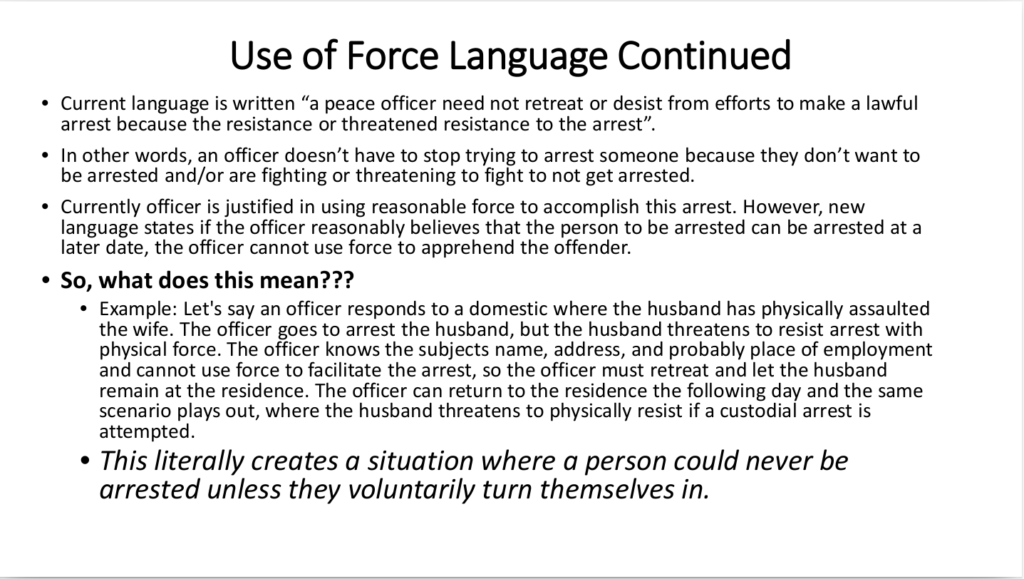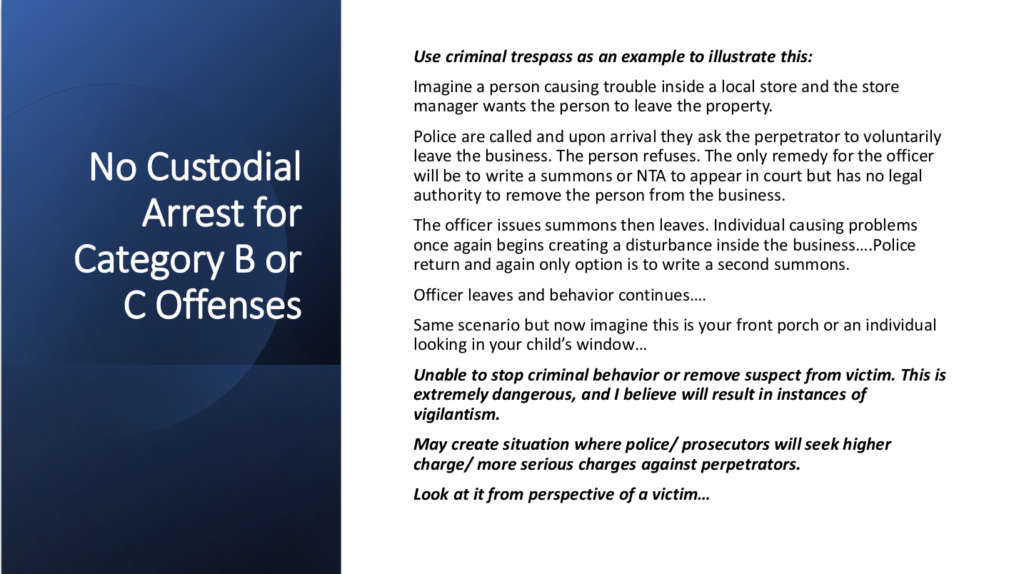Sheriff Brian Asbell was appointed as interim Sheriff of Peoria County in 2017. A Peoria County veteran and former jail superintendent, Asbell was the anointed successor of Sheriff Mike McCoy. He won his own race outright in 2018. Despite his pedigree as a Republican, he has frequently been portrayed as a progressive on issues of criminal justice. He was endorsed in 2018 by the Black Justice Project. In private, Asbell would tell people The New Jim Crow by Michelle Alexander changed his life, and the documentary 13th is his favorite (he probably watches it every Friday the 13th). “Guys I know, I know the criminal justice system is a racist system,” said Sheriff Asbell at a Young Revolution protest last summer. “There’s so much talk about the rotten apples. Rotten apples, rotten apples, rotten apples. Guys, it’s a rotten tree.” Clearly, this is the wokest sheriff in the land.
I’ve always been highly skeptical of Sheriff Asbell. He’s maintained a strong conviction in favor of cash bond, despite the obvious disparities among poor folk, especially people of color. But, nothing has proven my skepticism more valid than Sheriff Asbell’s relentless misinformation regarding HB 3653, a landmark criminal justice bill recently signed into law in Illinois. It’s the epitome of gaslighting to present oneself as supportive of criminal justice reform, only to turn around & blatantly lie about this bill.
Sheriff Asbell presented several delusional lamentations at the Peoria County Public Safety & Justice Committee on Tuesday, February 23rd, 2021. Without citing a single line from the actual bill, he misled the county board with almost every statement.
“If someone is resisting, and you know their identity and they’re not a clear and obvious threat to another person, and you have an opportunity to arrest them at a later time, you have a duty to retreat,” he said.
There is no duty to retreat anywhere in the bill. The word retreat is used only twice in the 764 page bill: once, where it says officers “need not retreat to make an arrest” and again, where it defines retreating. That’s it.
Sheriff Asbell provided a series of highly misleading slides which frequently take HB 3653 wildly out of context, especially regarding use of force.

Here’s the actual use of force language in HB 3653, everything in bold is what Sheriff Asbell conveniently leaves out:
“A peace officer, or any person whom he has summoned or directed to assist him, need not retreat or desist from efforts to make a lawful arrest because of resistance or threatened resistance to the arrest. He is justified in the use of any force which he reasonably believes, based on the totality of the circumstances, to be necessary to effect the arrest and of any force which he reasonably believes, based on the totality of the circumstances, to be necessary to defend himself or another from bodily harm while making the arrest.”
720 ILCS 5/7-5 page 282
So, where is Sheriff Asbell getting this absurd notion of a duty to retreat from. The very next sentence of the bill switches from addressing all use of force to only addressing lethal use of force.
“However, he is justified in using force likely to cause death or great bodily harm only when he reasonably believes, based on the totality of the circumstances, that such force is necessary to prevent death or great bodily harm to himself or such other person, or when he reasonably believes, based on the totality of the circumstances, both that:
720 ILCS 5/7-5 page 283-284
(1) Such force is necessary to prevent the arrest from being defeated by resistance or escape; the officer reasonably believes that the person to be arrested cannot be apprehended at a later date, and the officer reasonably believes that the person to be arrested is likely to cause great bodily harm to another; and
(2) The person to be arrested just committed or attempted a forcible felony which involves the infliction or attempting otherwise indicates that he will endanger human life or threatened to infliction of escape use by great of a bodily deadly harm or is weapon, or inflict great bodily harm unless arrested without delay.”
This means an officer is justified in using deadly force if the person to be arrested is a threat to another, or if an individual who is fleeing just committed a violent felony and they are an imminent threat to others while not being arrestable at a later date. So, the bill simply says when arresting someone you shouldn’t MURDER them if they aren’t 1) a threat to others, 2) could potentially be arrested more safely at a later date, and 3) the person just committed a violent offense. Nothing in the bill says you can’t arrest someone. Nothing in the bill says you need to retreat. Nothing in the bill says officers can’t use force to arrest someone. It’s merely saying, “Please don’t murder people unless you absolutely have too!” What a crazy concept? Sheriff Asbell is intentionally conflating use of lethal force with all use of force, despite this bill not saying that. Contrary to Asbell’s scurrilous assertions, this bill literally does not create a situation where no one can ever be arrested.
Next, Sheriff Asbell complained about a section of the bill that gives officers the discretion that instead of arresting people for B & C misdemeanors, they can issue citations instead. He fears this means officers can’t do anything about these situations and will increase vigilantism. He used this graphic to describe his concerns.

Under HB 3653, Class B & C misdemeanors are not eligible for pretrial detention. This means if you go in front of a judge for these offenses, there is an expectation you will be released pending trial unless the judge has a really good reason to detain someone. Since these crimes are assumed not eligible for pretrial detention, the bill encourages officers to issue summons “in lieu of custodial arrest” for these offenses permitted the individual in question isn’t a danger to anyone. It goes on to say, “A person arrested with or without a warrant for an offense (for which pretrial release may not be denied) may be released by the officer without appearing before a judge.” It uses the word “may” which means it is left up to the discretion of the officer.
So, not only can trespassers & disorderly conductors still be arrested for these offenses, but the bill does nothing to limit a police officer’s ability to legally detain someone and/or escort a suspect to a different location. In fact, the title of this section of the bill is “Person arrested; release from law enforcement custody and court appearance.” It says citations can be issued in lieu of arrest. “In lieu of” is Latin; it means “in place of.” This means B & C misdemeanors are still potentially offenses in which you could be arrested, and therefore be detained. These sections were added to give police greater discretion in who they arrest, so they have more time to investigate more serious offenses. It is safer for everyone involved to issue citations than it is to arrest & incarcerate someone. It is also cheaper.
How would the trespassing situation actually play out? Well, the officer tells the person to leave. They refuse. The officer says I’m going to lawfully detain you and escort you off of this property, then give you a summons to appear in court. The person refuses to be escorted away, i.e., they are obstructing an officer (which is still a class A misdemeanor), i.e., they can still be arrested and taken to jail.
This brings up another section of the bill the Asbell is intentionally misinterpreting: section 720 ILCS 5/31-1 which states you can’t charge an individual for resisting arrest “unless there is an underlying offense for which the person was initially subject to arrest.” This fixes the legal fiction of being guilty of resisting arrest despite not actually having committed an arrestable offense. Trespassing and disorderly conduct are still offenses, which you can still technically be arrested for, and if you obstruct an officer, you can be charged for that too.
Asbell also brings up the threat of domestic battery incidents. If anyone is committing domestic battery, it’s a minimum of a Class A misdemeanor. HB 3653 does not change this. In fact, it specifies that domestic battery is one of the few misdemeanors that makes a person eligible for detention pretrial, meaning they have to be arrested and go in front of a judge (the exact opposite of what Asbell is claiming).
The police love to use the pain & trauma of domestic & sexual abuse survivors as weapons against meaningful police reform. But here is what an actual survivors’ advocacy group, Chicago Alliance Against Sexual Exploitation (CAASE), had to say about HB 3653:
Through our work with survivors of sexual violence, we know how the criminal legal system often fails them. That’s why we are cheering the signing of the Pretrial Fairness Act into law. It ends money bail, replacing the practice of using wealth to determine who has their freedom before a trial with a system based on assessing risk. This is particularly important to survivors of gender-based violence, who gain a stronger voice in the new process.
Chicago Alliance Against Sexual Exploitation (CAASE)
Survivor advocates like CAASE had a seat at the table in crafting this transformative bill. Our input was anchored in our understanding of why criminal justice reform is so important to the safety of survivors and the whole community. When it’s implemented in January 2023, people with low incomes will no longer be locked up simply because they can’t pay bail. People won’t be incarcerated pre-trial because of racist and classist stereotypes that perpetuate fear against Black men, in particular. Survivors can advocate for what they need to feel safe and secure.
These reforms are based on lessons learned from other states, with Illinois being the first to abolish cash bail with support from the community of survivors. This law empowers them to be part of the process and allows people who have caused harm to repair their lives and be restored to the community. It’s a step towards a system rooted in equity and safety, rather than fear.
Sheriff Asbell says officers are under attack. Morale is down. Neither he nor his officers can possibly even conceive of why people don’t like them. Who knew that gaslighting people might not endear them towards you? Sheriff Asbell has done an excellent job at portraying himself as a reformer. However, his willingness to deceive people about this legislation shows his alleged “wokeness” is a hoax without any meaningful substance. His symbolic support of reform is used mainly to cover for a series of terrible policy positions that ultimately strengthen the rotten tree he claims to despise. Sheriff Asbell is the trunk of this rotten tree.
If you actually read the bill, and not just the cherry-picked sections police unions mislead with, it is actually difficult to maintain the coherence of Sheriff Asbell’s interpretation. You have to take many of these sections wildly out-of-context and make the text say things it just isn’t saying. Sheriff Asbell and police unions are doing the exact opposite of what they should do to increase community trust.
Don’t believe the hype. Don’t believe the copaganda.
This article was originally published on Strangecornersofthought.com.





























